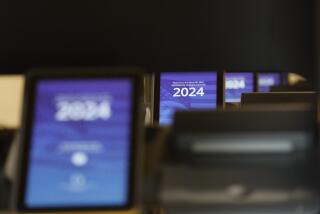Op-Ed: Black people will stand in line to vote today, but where has voting gotten us?
Facing the most consequential national election in modern American history, I find myself at once fortified and nearly paralyzed.
Fortified because I didn’t even have to think about what I’m going to do: vote. Voting — more specifically, fighting injustice and national moral decrepitude via the ballot — is something totally ingrained in black political life, and it has been since the 15th Amendment gave newly freed slaves the constitutional right to the ballot.
More than a choice for any individual candidate, my peoples’ vote has always been the necessary counterpoint to the white supremacy that continues to stain the country long after slavery. I knew this when I turned 18 in 1980 and voted for the first time, which turned out to be the dawn of the Reagan era and exactly the point at which the civil rights activism of the 1960s began to officially curdle into Morning in America and Make American Great Again (yes, Reagan said it first). Injustice and inequality was reasserting itself, and more than vote for X, I had to vote against that.
To do anything other than vote would violate another black tradition: Acting no matter what, in the midst of crises and invisibility.
For black people, being against, in opposition to, has defined our American struggle. Voting entirely for something or someone is a luxury we rarely have. Not even with Obama. The first black president was a Democrat after all, and it was well understood by 2008 that Democrats, pushed by Republicans, had acquiesced to too many racially conservative policies to be considered advocates of our best interests. Yet black support of Obama fit into a larger tradition of voting pragmatically and philosophically, which means we vote to advance, or at the very least preserve, some part of a racial justice agenda that has never been adopted in full by either party. What’s clear now is that Republicans are openly hostile to that agenda, and Democrats are not, and so my choice this time is easy. Simple.
Then there’s the near paralysis. What almost stops me is finally realizing that history can’t protect us from anything. It’s 2018, and after 160 years of fighting for full suffrage, black people are losing it. Voter suppression efforts are rampant in Georgia, with names gone from the rolls because of a new criteria called “exact matching.” Similar acts of suppression are happening in other states, in the wake of the Supreme Court’s evisceration of a crucial provision of the Voting Rights Act that required mostly Southern states to get permission before they changed voter laws. Republicans are in charge of these efforts. Democrats have objected, but as a party they’re doing nothing.
It’s a given that racism is alive and well. What is lethal and newly paralyzing is America’s reticence to confront it. I am used to compartmentalizing, to putting ideals on hold and playing a long game when it comes to voting. The goal is not only to gain ground, but to prevent any gained ground from being lost. The problem is that voting can’t help but feel like a terribly insufficient response to the complex, diffuse crises black people face now, and have always faced. The question we quietly ask ourselves, even as we stand in line at our polling places, is where has voting really gotten us?
Enter the Fray: First takes on the news of the minute from L.A. Times Opinion »
We got Obama into the White House, but that only wrought a vicious white backlash that gave us Trump. Even if voter suppression hadn’t made a roaring comeback this year, the idea of voting as a route to black evolution, never mind revolution, would be a hard argument to make. In the 1960s, voting rights was a battle cry in the South, the act of voting a political and racial protest; it was taking a stand for something. But it hasn’t evolved from a symbolic victory into something deeper, more embedded in the power structure, something more than a voting bloc to be wooed, halfheartedly, at election time. In 2018, blacks are still voting to keep disaster at bay.
There is a point at which the armor of tradition begins to crack, and these midterms feel like that point. If Trump’s rise doesn’t make white Americans believe in the fundamentally racist, ethnically isolationist nature of America, what will? The outrage and helplessness that I feel, and a kind of shame for myself and my country, has become almost impossible to articulate.
But cracking is not breaking. I know what I’m going to do Tuesday. I can’t wait around for white voters to sanction my feelings, to catch up to reality, can’t wait for them to glimpse the extraordinarily complex nature of hope and disappointment that I and other black people carry into the polls and express on our ballots. To do anything other than vote would violate another black tradition: Acting no matter what, in the midst of crises and invisibility, striving to get past counterpoint to catalyst. The Black Panthers used to say: “Do something, Negro, if you only spit.” I’ll be doing more than that on Tuesday. Hopefully.
Erin Aubry Kaplan is a contributing writer to Opinion.
Follow the Opinion section on Twitter @latimesopinion and Facebook.
More to Read
A cure for the common opinion
Get thought-provoking perspectives with our weekly newsletter.
You may occasionally receive promotional content from the Los Angeles Times.





